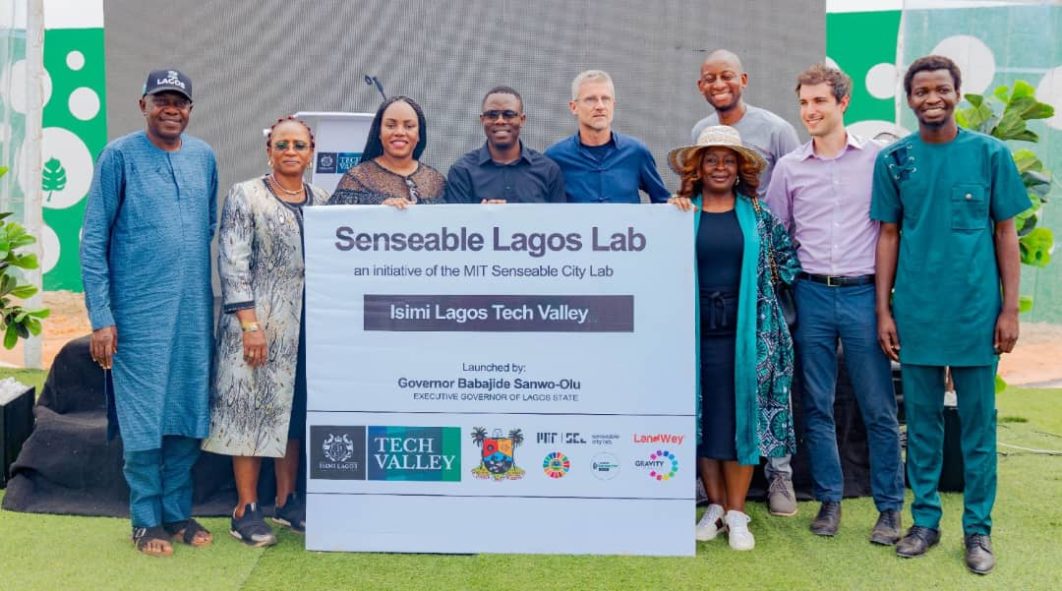Lagos State Governor, Mr Babajide Sanwo-Olu, has launched the Senseable Lagos Lab, the first MIT Senseable City research facility in Africa at Isimi Lagos, Epe.
The project, which a residential real estate company facilitates in Nigeria, LandWey Investment Ltd, in partnership with the team members of MIT Senseable City Lab and the Lagos State Government, was officially launched at the maiden edition of the Lagos Future City Week organized by LandWey.
Speaking during the ground-breaking ceremony, Governor Sanwo-Olu, who his Special Adviser represented on SDGs and Investment, Solape Hammond, expressed delight at the initiative, which he said aligns with the state government’s focus on a sustainable Lagos.
Governor Sanwo-Olu said: “I wholeheartedly commend Landwey Investment for attracting this partnership. The Senseable Lagos Lab launch is a very exciting project for us as it follows our climate adaptation and sustainable resilience plan for Lagos. We have identified many projects which will help us address this including; waste management, flood risk, green building and some other challenges. Thus, it is exciting to see the fruition of this partnership as it would help us address some if not all of these challenges.”
Read also: Lagos Bills Tech Hubs ₦200,000 For Safety Audit
In her remarks on what the partnership means for education, Hammond said: “We have recently established the University of Science and Technology, which will focus on churning out those graduates who will be providing solutions through science and technology. This makes it an apt time to have this partnership as Lagos is well equipped with several universities for the Senseable City Lab and Isimi Tech Valley to work with across the state.” She remarked.
As part of the event lineup, the Co-Founder and Director of MIT Senseable City Labs, Carlo Ratti, walked the audience through the vision of the research initiative, highlighting some of the global solutions developed by the facility through its meticulous research.
“We are elated about this partnership as it is our first ever in Africa. Building sustainable cities around the world has helped us realize the peculiarity of each city. Each one has its own distinct problem; to which we use data to provide solutions. We are curious to possibly discover Lagos’ environmental challenges and equally excited to proffer solutions using data,” Ratti noted.
With an overall aim of anticipating future trends, the Senseable Lagos Lab will bring together researchers from varied academic disciplines to conduct real time work on revolutionary ideas and innovative real-world demonstrations in Lagos state.
The Senseable City Lab’s work has been shown at prestigious venues such as the Venice Biennale, the Design Museum Barcelona, the Canadian Centre for Architecture, and the Museum of Modern Art (MoMA) in New York. The Digital Water Pavilion was named the Best Invention of the Year in 2007 by IME state government Magazine, and the Copenhagen Wheel was named the Best Invention of the Year in 2014.
Committed to promoting the adoption of sustainable living in Nigeria and, by extension, Africa, the relationship between Isimi Tech Valley and MIT Senseable City Lab hopes to provide data-led long-term solutions to the ever-growing megacity, which will in turn encourage more investment.
Lagos Government’s Efforts In Sustainability
The Lagos Government is at the forefront of ensuring a sustainable state is achieved through its THEMES Agenda, aimed at achieving the SDG goals best through various projects.
The THEMES Agenda is an acronym for “Traffic Management and Transportation, Health and Environment, Education and Technology, Making Lagos a 21st Century Economy, Entertainment and Tourism, as well as Security and Governance.”
In November this year, the state’s Office of Sustainable Development Goals and Investment launched the Lagos SDGs Grant Competition to fund 51 projects across the 167 targets of the SDGs in the State as part of the Government’s commitment to shared prosperity.
Solape Hammond explained that the Grant Competition was conceived as part of the strategy to mobilize collective action to advance progress on the SDGs through social, economic, and environmental initiatives that are positive, transformative, collaborative, and scalable.
